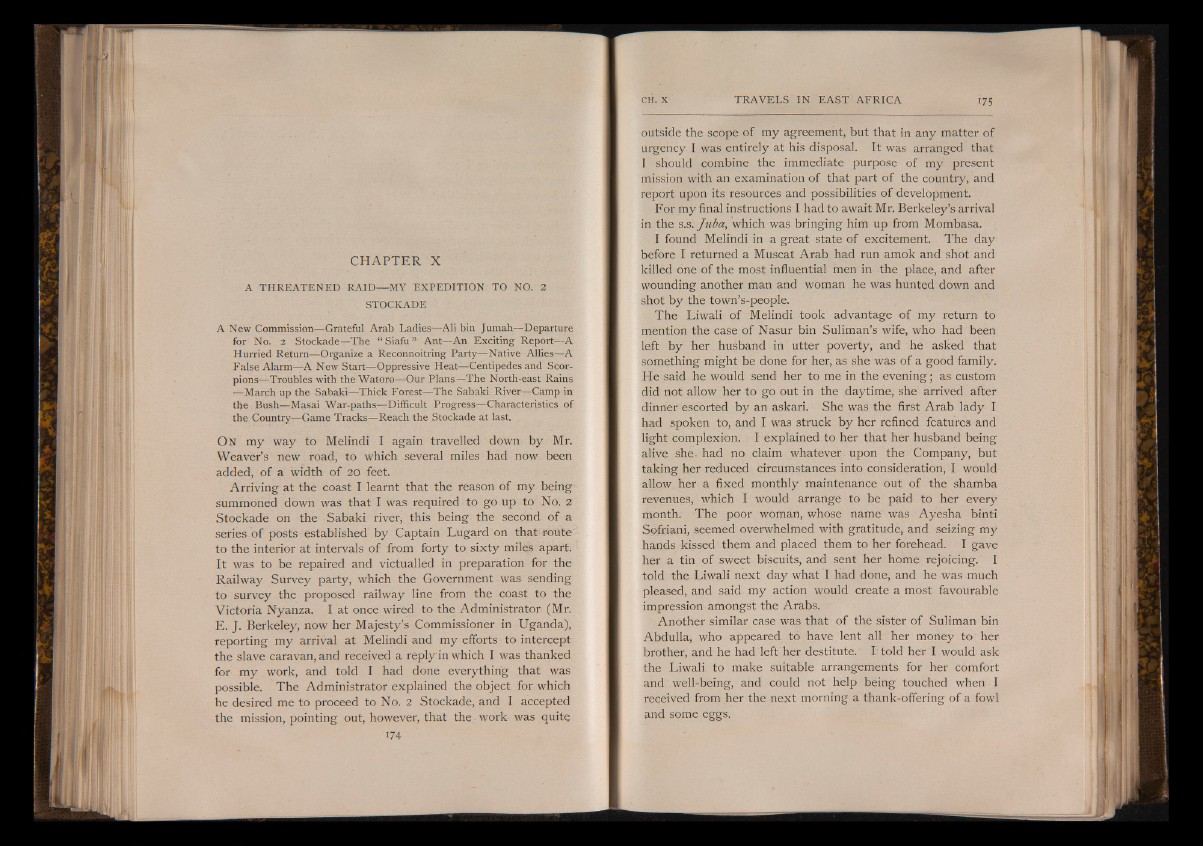
CH A P T ER X
A THREATENED RAID— MY EXPEDITION TO NO. 2
STOCKADE
A New Commission— Grateful Arab Ladies— Ali bin Jumah— Departure
for No. 2 Stockade—The “ Siafu” Ant— An Exciting Report—A
Hurried Return— Organize a Reconnoitring Party— Native Allies— A
False Alarm— A New Start— Oppressive Heat— Centipedes and Scorpions—
Troubles with the Watoro— Our Plans—The North-east Rains
— March up the SabakiB-Thick Forest— The Sabaki River— Camp in
the BushijMasai War-paths— Difficult Progress— Characteristics of
the Country:—Game Tracks— Reach the Stockade at last.
ON my way to Melindi I again travelled down by Mr.
Weaver’s new road, to which several miles had now been
added, of a width of 20 feet.
Arriving at the coast I learnt that the reason of my being
summoned down was that I was required to go up to No. 2
Stockade on the Sabaki river, this being the second of a
series of posts established by Captain Lugard on that route
to the interior at intervals of from forty to sixty miles apart.
It was to be repaired and victualled in preparation for the
Railway Survey party, which the Government was sending
to survey the proposed railway line from the coast to the
Victoria Nyanza. I at once wired to the Administrator- (Mr.
E. J. Berkeley, now her Majesty’s Commissioner in Uganda),
reporting my arrival at Melindi and my efforts to intercept
the slave caravan, and received a replyin which I was thanked
for my work, and told I had done everything that was
possible. The Administrator explained the object for which
he desired me to proceed to No. 2 Stockade, and I accepted
the mission, pointing out, however, that the work was quite
outside the scope of my agreement, but that in any matter of
urgency I was entirely at his disposal. It was arranged that
I should combine the immediate purpose of my present
mission with an examination of that part of the country, and
report upon its resources and possibilities of development.
For my final instructions I had to await Mr. Berkeley’s arrival
in the s.s. Juba, which was bringing him up from Mombasa.
I found Melindi in a great state of excitement. The day
before I returned a Muscat Arab had run amok and shot and
killed one of the most influential men in the place, and after
wounding another man and woman he was hunted down and
shot by the town’s-people.
The Liwali of Melindi took advantage of my return to
mention the case of Nasur bin Suliman’s wife, who had been
left by her husband in utter poverty, and he asked that
something might be done for her, as she was of a good family.
He said he would send her to me in the evening; as custom
did not allow her to go out in the daytime, she arrived after
dinner escorted by an askari. She was the first Arab lady I
had spoken to, and I was struck by her refined features and
light complexion. I explained to her that her husband being
alive she- had no claim whatever upon the Company, but
taking her reduced circumstances into consideration, I would
allow her a fixed monthly maintenance out of the shamba
revenues, which I would arrange to be paid to her every
month. The poor woman, whose name was Ayesha binti
Sofriani, seemed overwhelmed with gratitude, and seizing my
hands kissed them and placed them to her forehead. I gave
her a tin of sweet biscuits, and sent her home rejoicing. I
told the Liwali next day what I had done, and he was much
pleased, and said my action would create a most favourable
impression amongst the Arabs.
Another similar case was that of the sister of Suliman bin
Abdulla, who appeared to have lent all her money to her
brother, and he had left her destitute. I told her I would ask
the Liwali to make suitable arrangements for her comfort
and well-being, and could not help being touched when I
received from her the next morning a thank-offering of a fowl
and some eggs.